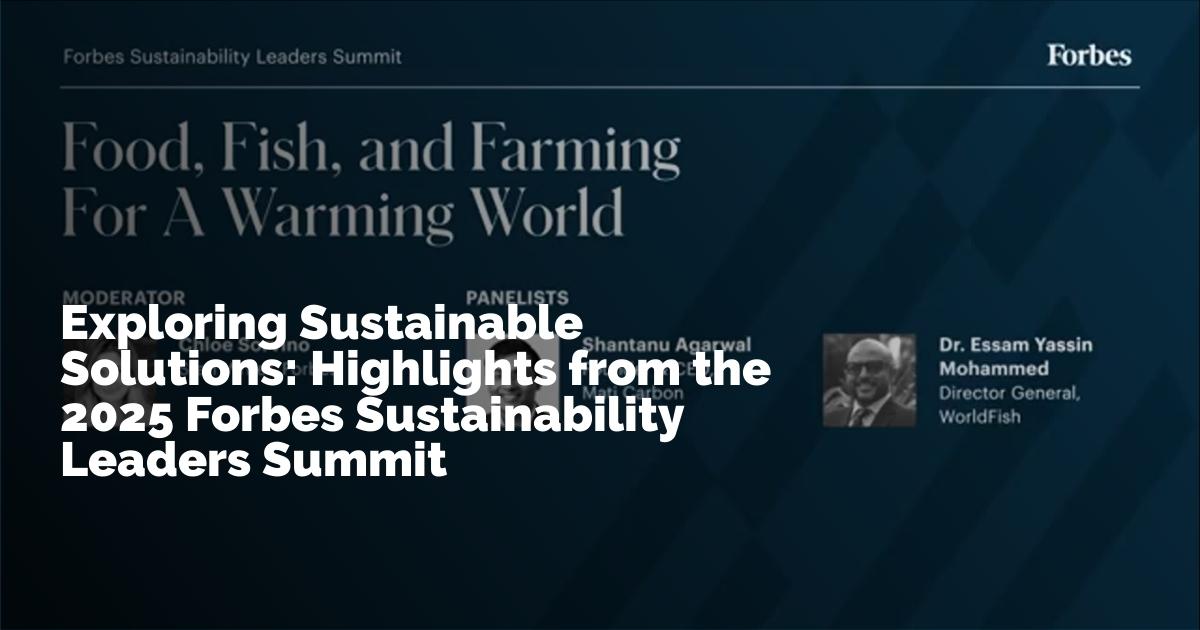Introduction: A New Era of Sustainable Food Systems
As the world grapples with the profound challenges posed by climate change, food systems stand at the forefront of necessary transformation. Modern food production, from the seas to the fields, needs to evolve significantly to meet the demands of an increasingly warming world. The 2025 Forbes Sustainability Leaders Summit, held in New York City, highlights these critical issues, bringing together industry experts, innovators, and leaders to discuss sustainable practices in agriculture and aquaculture.
The Crisis and Potential of Food Systems
Food systems are intricately linked to the climate challenge. They are simultaneously one of the largest contributors to greenhouse gas emissions and one of the sectors most vulnerable to the effects of climate change. This dual role makes transforming food systems both a necessity and a tremendous opportunity for climate action. By adopting more responsible practices, food systems can significantly reduce emissions and improve their resilience against climate impacts, ultimately paving the way for a more sustainable future.
Innovations in Sustainable Aquaculture
Aquaculture, the farming of fish and other aquatic organisms, is undergoing substantial innovation aimed at enhancing sustainability. Contributing significantly to the global food supply, aquaculture presents both challenges and opportunities in the quest for a more sustainable food system. Leaders in the field are implementing strategies to reduce overfishing and minimize environmental impacts, employing technology to improve efficiency and sustainability.
One such leader, Dr. Essam Yassin Mohammed of WorldFish, emphasizes the importance of sustainable aquaculture practices that align with ecological preservation and community needs. By investing in technologies that promote the health of aquatic ecosystems and enhance fish stock management, aquaculture can contribute to food security while safeguarding the environment.
The Promise of Regenerative Farming
Regenerative farming is rapidly gaining attention as a powerful tool for combating climate change and restoring ecosystem health. This approach goes beyond sustainable practices by actively improving soil health, increasing biodiversity, and reducing carbon footprints. By focusing on natural processes and cycles, regenerative farming seeks to enhance the resilience of agricultural systems and ensure long-term productivity.
At the summit, leaders explore the potential of regenerative farming to transform agriculture from a climate problem into a climate solution. By using techniques such as crop rotation, cover cropping, and reduced tillage, regenerative practices can improve soil structure, sequester carbon, and reduce the need for synthetic fertilizers and pesticides.
Culinary Choices: Shaping the Future of Consumption
Culinary choices play a crucial role in shaping consumer demand and driving the adoption of sustainable food practices. With growing awareness of the environmental impact of food consumption, there is a significant shift towards plant-based diets and locally sourced produce. These trends reflect broader consumer interest in sustainability and are prompting food producers and retailers to adapt their offerings accordingly.
Shantanu Agarwal, Founder & CEO of Mati Carbon, discusses at the summit how food companies can align their products and practices with sustainable consumer preferences. By promoting transparency, investing in sustainable supply chains, and innovating new products that cater to eco-conscious consumers, businesses can drive change across the industry.
Building Resilience in Climate-Impacted Communities
Food systems must be resilient to withstand the adverse effects of climate change, ensuring that vulnerable communities have reliable access to nutritious food. This requires an integrated approach that considers not only environmental factors but also social and economic dimensions. Initiatives that support smallholder farmers, promote fair trade, and facilitate access to climate-smart technologies are vital to building resilience.
At the summit, leaders emphasize the importance of collaborative efforts to strengthen food system resilience. By leveraging public and private partnerships, investing in research and innovation, and empowering local communities, it is possible to create food systems that are both resilient to climate shocks and capable of feeding a growing global population.
A Sustainable Future: Moving Forward
The conversations at the 2025 Forbes Sustainability Leaders Summit underscore the critical need for innovation and collaboration in building a sustainable future for global food systems. By embracing practices that reduce emissions, promote ecosystem health, and support resilient communities, the food sector can play a pivotal role in addressing the climate crisis.
The summit serves as a call to action for stakeholders across the food chain, urging them to work together to implement solutions that not only mitigate climate impacts but also align with broader sustainability goals. As we look towards a warming world, the path to a sustainable food system is clear: innovation, collaboration, and a commitment to responsible practices are essential to ensure a nourishing and equitable future for all.
출처 : Original Source

